An overwhelming majority of Greeks considers religion as important – Greece holds the highest rate of Christian believers in the European Union while young Europeans in general are turning their back on religion. What about the young population in Greece and its relation to the church? Anna from Chania and Maria from Griva share their views on the role of religion in the daily life of Greece’s young generation.
In ancient times, religion was an obvious part of a Greek’s everyday life – from animal sacrifices and temples to the myriad of the Olympian gods led by Zeus. Gods became patrons of cities – Athens worshipped Athena, the goddess of wisdom; Aphrodite was the patron of Corinth and Helios of Rhodes. Visiting a temple was common and saying a prayer when passing one in the street was a usual sight. Today’s religious affiliation of Greeks has little to do with the myriad of gods. As of 2017, 90% of Greeks identified as Orthodox Christians. At the same time, the young people don’t believe as much in organised religion as their parents do. Even if some still identify as Orthodox Christians, they most likely don’t go to church every week, don’t fast before Easter, don’t pray before they eat. Which role does religion play in the Mediterranean state then?
Do Young Greeks Believe in Orthodox Christianity?
Maria: I don’t think the majority of Greek young people believe in God. Most people in my surroundings don’t believe. They may be religious in theory because they were raised in a religious family and “taught“ to believe but they don’t have this solid grasp of religion.
Anna: Especially in comparison with their parents, young people nowadays rather don’t believe. The ones who do usually come from rural areas. I am from Crete and there is a noticeable difference between how religious people in Chania – the second biggest city on the island – are, and the ones raised in small villages. The religious conviction also depends on the education level. The more educated, the more sceptical people seem towards the explanation of the creation of the universe presented in the Bible, for example.
What Makes the Church Lose its Grip on Young Greeks?
Maria: For the liberal young adults, many controversial practices or statements of the Greek Orthodox Church don’t make sense. Recently, the Greek Orthodox Church frowned upon yoga saying that yoga practices are incompatible with Christian faith. The Church is also turning a blind eye on Covid-19: The ritual of the Holy Communion remained unchanged despite the pandemic. It’s a practice during which the priest dips a spoon into bread and wine and puts it into the mouth of the first person in line. Then into the next person’s mouth. And the next one. According to the Church, sipping wine from the same spoon during mass can’t carry diseases. In January, when the pandemic reached another peak, the Church decided to ignore the new restrictions, leaving its doors open for people to celebrate Epiphany.
Anna: Another factor is the harsh position of the Greek Church regarding LGBTQI+ rights. Greece is a culturally liberal country and same-sex unions are legally recognised since 2015. In 2018, Greece saw its first gay weddings. Priest Stylianos Karpathiou who had denied the possible spread of Covid-19 at the Holy Communion, even said that “Homosexuality is a curse, a deadly sin, it goes against psychological and biological normality“. The Church regards homosexuality as an “abomination”. Meanwhile, Archbishops are believed to be involved in stealing funds and pedophilia.
I perceive Church officials as wealthy people with endless privileges. In 2011, the government introduced a property tax in order to fulfill Greece’s austerity targets – Greek churches and monasteries were exempt from paying it.
Maria: The general feeling among young greeks remains: the church has accumulated a lot of wealth, for example, through state properties; there are many very rich priests and people suspect a lot of corruption. Apart from that, churches in general are losing young people who realise that a book written thousands of years ago shouldn’t dictate their life. It’s a combination – people being frustrated of the inner workings of the Greek Orthodox Church and the general fact of not accepting the church as an authority anymore.
What About Religious Education in School?
Anna: Religious education has been part of the curriculum for a long time, but a few years ago, it changed its status from compulsory to optional, thanks to Syriza. That’s why when I was in school, the subject wasn’t mandatory for Muslims and Catholics. The focus was entirely put on Christianity and nothing was taught about other religions at all. I didn’t like that there was no room for critical discussion as Christian religion was taught as the “only truth“. My family, however, has never been religious; hence, religion classes seemed boring to me. But I remember classmates coming from religious families paying more attention.
Maria: The nature of this subject meets the opposition of Syriza (The Coalition of the Radical Left – Progressive Alliance) – the second biggest party in the Parliament – which is on the left side of political spectrum. Orthodox Christianity is affiliated with the rather conservative or even right-wing parties. Syriza has been calling for secularisation, meaning the separation of the Greek state from the Church for a long time. That’s why the subject’s status was changed to non-obligatory as soon as Syriza came to power. They also want religious education in school to reflect the increasing diversity of faiths, especially in times of the arrival of refugees in Greece.
I agree with Syriza’s way of dealing with religion as a voluntary and multiperspective school subject. For students who were socialised with the church, learning about religion is probably interesting. But I don’t think teaching Christianity in school increases the interest or attachment of non-believers. However, to me, it’s ridiculous that in some parts of the world attending religion classes is still compulsory.
I recall that every morning, we were all obliged to gather up and say a prayer for 2-3 minutes. One of the students would be chosen to speak in front of the class and say the prayer out loud, sometimes even as a punishment for bad behaviour.
Is Religion Part of Greek Identity? Does It Affect Your Daily Life?
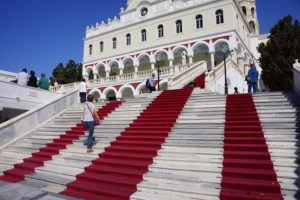
Church of Panagia Evangelistria of Tinos (Our Lady of Tinos), Tinos town, John Winder, https://www.flickr.com/photos/83833206@N00/45663995964 (CC BY-NC-ND 2.0)
Maria and Anna: Religion is considered to be part of Greek identity. That’s especially true for elderly people as most of them are religious or believe there’s a higher power. In 2018 76% of Greeks said that their nationality was defined by Christianity.
Maria: Language is also part of our identity, and maybe even a bigger part. Spain, Italy and Belgium have more than one official language or speak various dialects. In Greece, apart from some regions with very strong accents, language-wise we’re pretty much the same.
The way I still feel it’s part of my everyday life usually manifests itself on holidays – there are certain traditions connected to Christmas and Easter. We also have bank holidays related to religion, such as Epiphany, Clean Monday, Good Friday, Dormition of the Mother of God, Whit Monday. If I want to do something on Easter, most shops will be closed. But other than that, as a non-believer I don’t feel the impact.
Anna: It’s the same for me. I go to church only once a year because my grandmother insists and it’s a tradition. She finds it important but if she wasn’t there, I wouldn’t go. It’s not a problem for me to go. I don’t feel the controversy because I go there for 10 minutes once an year. Apart from that I don’t attend church service and I don’t feel like I have to.
The influence of the Greek Church can be felt more than elsewhere in Mount Athos – the so-called Holy Mountain, which is an autonomous and self-governed territory of Greece. It has banned women and children for more than 1000 years.
Tinos, the island of faith, is also important. It is known for the Church of Panagia Evangelistria and the icon of Virgin Mary which is believed to be miraculous. When a woman wants to get pregnant, like my grandmother did, she’d go there, pray and thank God. Another type of religious influence is felt in Thrace, but not by Orthodox Church – most of the Muslim minority in Greece resides there and makes up 29% of the population.
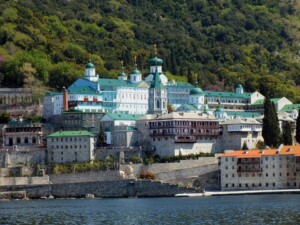
Mount Athos, 12019 / 10259 images, https://pixabay.com/photos/mount-athos-greece-monastery-90616/.
Do Differences in Religious Views Cause Conflicts Within Families?
Anna: It really depends on the family. One of my friends who is religious feels very awkward at family dinners where his whole family speaks about God, and he has to pray with them, although he doesn’t believe in it.
Maria: There are generational conflicts where grandparents are believers and I guess most of the parents also are. However, last year my brother openly stated that he didn’t believe in God, my aunt and uncle claimed that he was just copying me. They said it wasn’t true he didn’t believe and that he was only saying it because nowadays that’s trendy. But it’s not like one would get expelled from the family or anything serious – at least not in my surrounding.
The Greek Orthodox Church still has a noticeable influence on the political life in the country where it tends to support conservative and right-wing parties and the government tries to avoid clashes with the Church. If political parties want to secure the elderly people’s votes during elections, one thing is for sure – they’d better not openly oppose the Church’s statements. When it comes to its relationship with youngsters, however, influence barely exists, despite the statistics that claim otherwise.

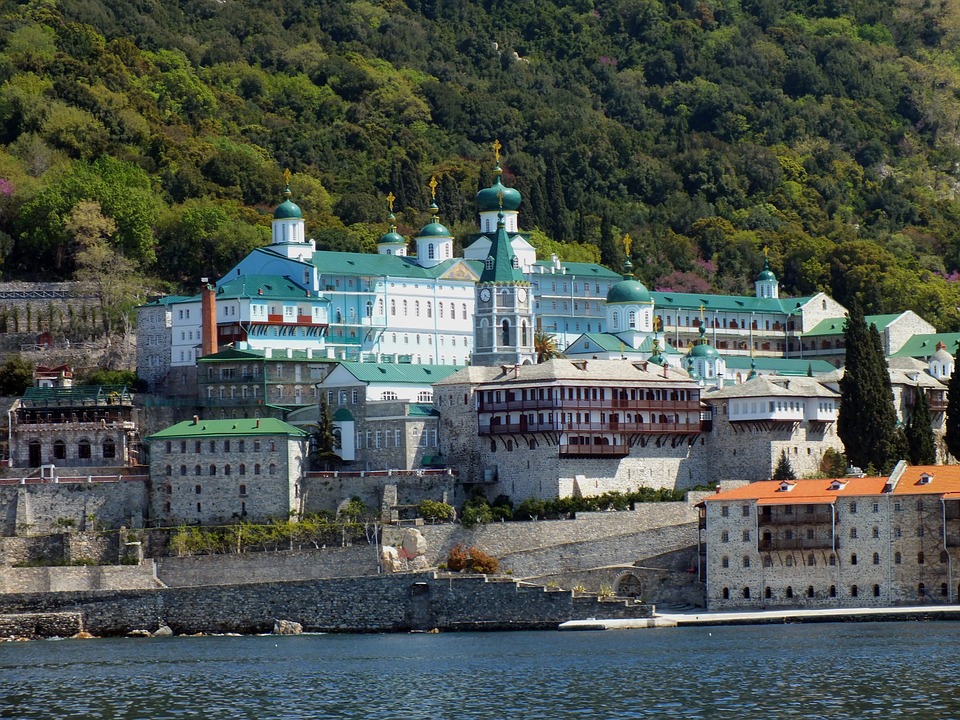
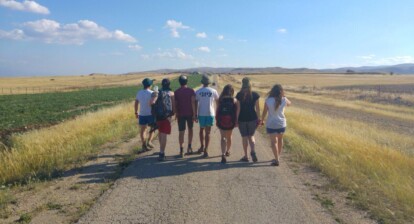
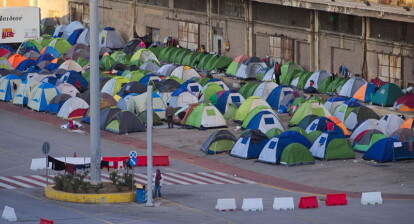
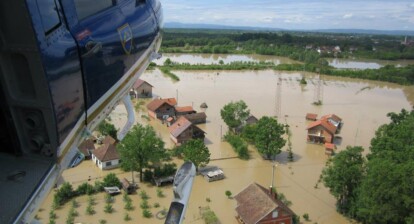
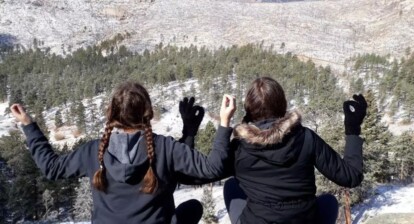
Pingback: Traces of the Balkan Wars - EUSTORY History Campus